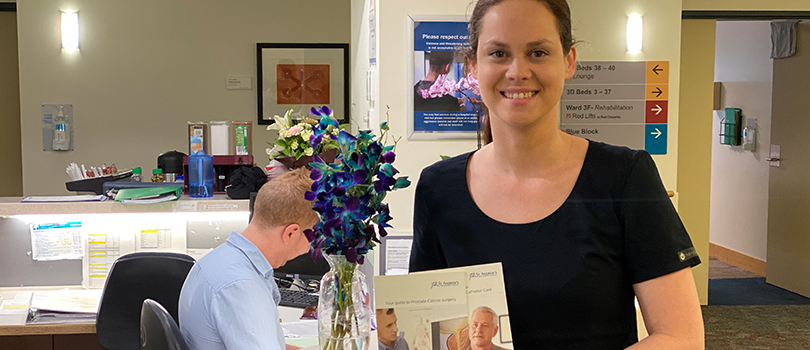
Supporting men during their cancer journey was a natural career move for St Andrew’s War Memorial Hospital Prostate Cancer Specialist Nurse Kitty Redmond.
As a graduate nurse in 2012, Kitty worked within St Andrew’s fast paced general surgical and urology ward. In August 2020, Kitty played a significant role in setting up the service within the hospital, supporting men who required surgical treatment for prostate cancer.
Kitty understands that men traditionally don’t talk about their health concerns as openly as women.
“For most men, diagnosis of prostate cancer comes as a huge shock. Some react by calling all their mates and telling them to go out right away and get health checks while others don’t say anything to anyone at all,” Kitty said.
“Often men that I care for take a 'She'll be right' attitude to their health and would much prefer to get on with life than sit and dwell on their worries or concerns.
“For this reason, it can be hard to get men to open up about how they are really managing and to prioritise their physical and mental health.
“I see challenging the preconceived idea some have equating speaking about your struggles to being weak, as an important part of my job,” she said.
Kitty works in a multidisciplinary team who provide collaborative care to patients before and after their surgery.
“My role is to help navigate a patient’s experience – help them understand what to expect throughout their journey and as you can imagine, there is often a lot of anxiety around that,” Kitty said.
“Most patients come to me knowing what the expected outcomes of surgery will be, for example, changes to urinary function and sexual function – but they have many questions around that.
“Each patient and their experience is unique and that uncertainty is often the hardest to manage because you can’t tell a person exactly what their recovery will look like.
“I’ve learnt that being completely honest is one of the most helpful things I can do,” she said.
Kitty finds joy in providing quality care to her patients.
“I love being able to make a difference in the life of patients and their families at a time when things are tough,” Kitty says.
“I usually provide care to patients up to six-weeks post op and sometimes longer if they require extra support.
“Encouraging men to talk about their health is something I’m passionate about.
“Early detection means better outcomes,” she said.